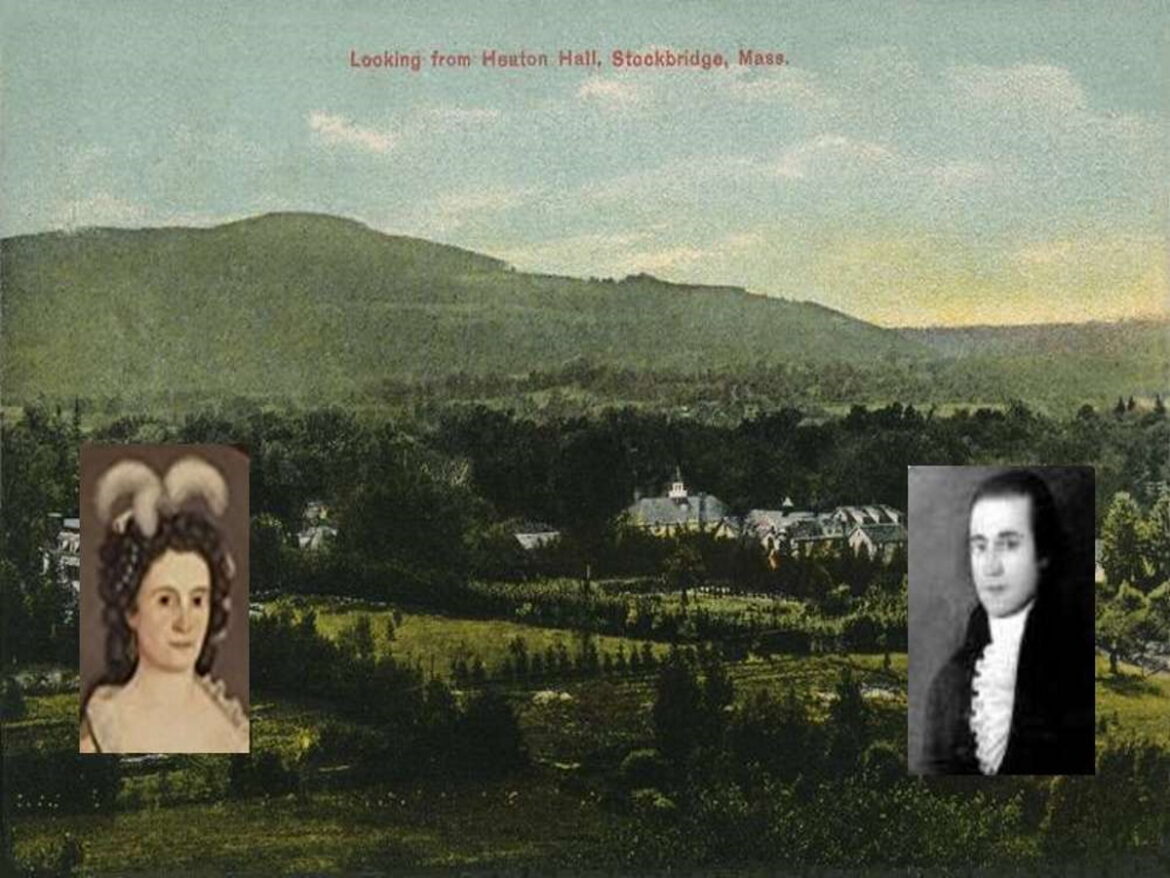Mary Gray Bidwell and her husband Barnabas resembled in many ways John and Abigail Adams. Both belonged to the local gentry, and they had brains and ambition. Like the Adamses, they loved each other and corresponded regularly during Barnabas’ long absences on political business.
But unlike Abigail Adams, Mary Gray Bidwell died at the age of 44, leaving her husband vulnerable to his political enemies.
“Barnabas Bidwell’s life didn’t exactly spin out of control after his wife, Mary Gray Bidwell died suddenly in February of 1808,” wrote Brian Burke. “But without knowing it, he had suddenly become more vulnerable to the tides of political fortune.”
Mary Gray Bidwell
The seven wealthy families who ruled the towns and villages along the Upper Connecticut River Valley were known as the Connecticut River Gods. Mary belonged to four of them: the Stoddards, the Partridges, the Dwights and the Williamses. She undoubtedly knew the other three, the Ashleys, the Pynchons and the Porters.
The River Gods, also known as the Mansion People, set the tone for the region’s culture and fashion. They also maintained political control of Western Massachusetts
Into that milieu Mary was born May 28, 1764, in Stockbridge, Mass.

Stockbridge around 1912
When she was still a young girl, her father suffered physical and economic setbacks. So she went to live with her mother’s brother, Marshall Spring, in Watertown, Mass. Her uncle made sure she received a good education. She fell in love with a rising political star, 32-year-old Barnabas Bidwell. At 29, she married him in Watertown, and the newlyweds moved to The Elms, a house he’d bought earlier in Stockbridge.
They lived across the street from Pamela Dwight, a river goddess married to Judge Theodore Sedgwick. Mary’s mother, Pamela Dwight’s second cousin, moved in with the Bidwells.
Mary moved comfortably among the local elite. A contemporary wrote of her,
In polished society she well was regarded:
Her manner mild her taste refined
She social talents always shone
Her wit and charm for every kind.
A portrait of her, featured on the cover of the book, Remarkable Women of New England by Carol Owens, reveals an elegant beauty.
Barnabas Bidwell
Barnabas Bidwell, the son of the Rev. Adonijah Bidwell, graduated from Yale College and studied law at Brown. And he was going places, with help from his neighbor Judge Theodore Sedgwick.
Like Sedgwick, Barnabas Bidwell belonged to the Federalist Party, and with Sedgwick’s help he rose swiftly. Elected to the Massachusetts General Court as representative and senator, he then moved on to Congress in 1805.
But not as a Federalist.
By 1805, Barnabas Bidwell had switched sides to the Democratic-Republican Party, hated throughout much of New England. In Congress, he defended President Thomas Jefferson’s embargo on trade with Britain and his purchase of Florida.
By then Bidwell had earned the enmity of his former mentor. When Sedgwick retired from Congress in 1801, he wrote a letter to the editor summing up the Federalist Party accomplishments.
Bidwell wrote a nasty response: “…a solid majority will eventually oppose and crush them [the Federalists] And blessed be God that day appears to be fast approaching.”
Then he attacked Sedgwick personally. Sedgwick did not forget.
It All Unravels
Barnabas Bidwell returned to Massachusetts in 1807 as the commonwealth’s attorney general. Mary Gray Bidwell died suddenly on February 1, 1808.
Mary’s mother died shortly thereafter. Her cousin, Pamela Dwight Sedgwick, had died shortly before Mary did. Thus, Barnabas Bidwell no longer had the protection of three women who might well have prevented Judge Sedgwick from exacting revenge.
Berkshire County
Early in his career, Barnabas Bidwell was appointed treasurer of Berkshire County, a position he held in name only. Clerks did all the work while he rose through the political ranks. He still served as Berkshire County treasurer when his name came up for consideration as a U.S. Supreme Court justice.
Sedgwick’s political allies picked that moment in 1810 to frame Barnabas Bidwell. They accused him of embezzling from the Berkshire County treasury.
A clerk, since dead, had actually been responsible for a minor discrepancy in the Berkshire County accounts. But the Federalists exaggerated Bidwell’s role in the scandal, and he fled to Canada.
It took seven years for the matter to be cleared up. Bidwell paid a fine, but remained in Canada where he won election to the Legislative Assembly of Upper Canada. He never took office, though, because opponents successfully claimed he was a fugitive from justice and an immoral character.
He lived in Canada the rest of his life, so much different than if Mary Gray Bidwell had lived longer. Mary, her mother and her cousin Pamela Dwight Sedgwick would probably have intervened to suppress the accusations against Barnabas.
Barnabas Bidwell died in 1833.
While mourning his wife, he had written a poem to her:
The rain patterns on the roof
And from the eves descends.
The storm keeps visitants aloof
And even shuts out friends.
So sweetly all my moments flew
When Mary was my bride
How oft I do those scenes review
With Mary at my side.
This story about Mary Gray Bidwell was updated in 2023.





2 comments
[…] John Ashley, a Connecticut River God, settled the 329 acres of Bartholomew’s Cobble before the American Revolution. Ashley enslaved an […]
[…] In addition to the Pynchons, the River Gods who came to dominate the Massachusetts river towns in Hampshire County included Ashleys, Dwights, Partridges, Porters and Williamses. […]
Comments are closed.